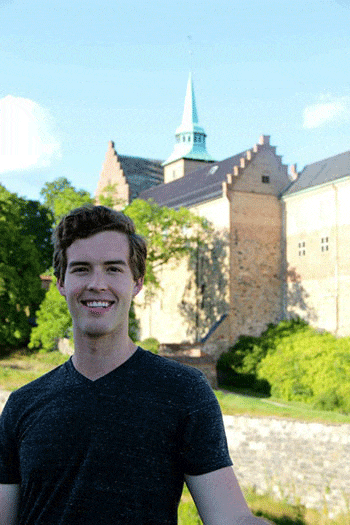Andrew Sayer ’15: Three majors, two minors, and a prestigious history prize
By Vicki-Ann Downing
As the College prepares to observe its Ninety-Seventh Commencement Exercises on Sunday, May 17, we celebrate the accomplishments and character of members of the Class of 2015.
When multiple concussions knocked goalie Andrew Sayer ’15 (San Diego, Calif.) out of the lacrosse net for good during his freshman season at Providence College, he shifted his intense focus to the classroom — with winning results.
Sayer graduated with three majors — history, political science, and American studies — and two minors — economics and public administration. He won the prestigious Gilder Lehrman History Scholar Award, given to the top 15 American history students in the country. He was one of a dozen students nationally selected to present a research paper at the McNeil Center for Early American Studies at the University of Pennsylvania.
This summer, he will begin studies at Brown University toward a master’s degree in urban education policy, with the hope of eventually studying for a Ph.D. and law degree in constitutional law and American legal history, running for public office, and becoming a professor.
“Andrew is fantastic, engaging, smart, ambitious, and curious,” said Dr. Edward E. Andrews ’01, associate professor of history. “He’s an absolute star, and he’s definitely going places.”

Sayer fell in love with PC and its campus during a visit when he was a high school senior, but the transition from one coast to the other was not easy.
“I had a difficult time when I came from San Diego,” said Sayer. “Freshman year was the hardest year of my life. It was really medically hard, recovering from concussions. Sophomore year, I had the opportunity to transfer. I think having that choice was healthy for me. I really looked at the College, and I decided to stay. From then on, it really increased my enjoyment of PC.”
Dr. Steven C. Smith, assistant professor of history, nominated Sayer for the McNeil Center for Early American Studies Undergraduate Research Workshop, which took place in February. Fifteen students from colleges around the country had the opportunity to gather at the McNeil Center, a leading research institution devoted to early American history, and discuss ideas, source materials, and research methods.
Smith, who accompanied Sayer to Pennsylvania, called him a “truly exceptional” student.
“Andrew has a way of making every class he enrolls in a better experience — for the students and the professors — just through the sheer force of his infectious, positive personality and the enthusiasm he brings to each discussion,” said Smith. “Moreover, Andrew’s opinion, because of his energy and intellect, tends to carry tremendous weight with his peers. In other words, he is looked to by his classmates as a leader and looked upon by faculty mentors as the most ideal of students.
“Andrew has dedicated his life to using the past to help shape a better future because he has a desire to understand who we are as a society and a culture and how we can move forward,” said Smith. “We need people with his energy, his enthusiasm, and his willingness and commitment to tackle tough, potentially divisive questions and problems head-on.”
Sayer returned to the McNeil Center in April to present his research paper, in which he used John Hancock’s life as a case study of economics in Boston. He located and researched Hancock’s log books, receipts, and correspondence at the Massachusetts Historical Society in Boston.
“I like that model — using a small scale to talk about a larger-scale topic,” said Sayer. “Hancock is surely the best character to look at in a lot of ways — history, economy, politics, being a social leader.”
Sayer said the paper should probably be a book, but his interests have shifted now to legal history.
In early June, he will receive the Gilder Lehrman Award at the Gilder Lehrman Institute of American History in New York City. The program recognizes 15 outstanding college juniors and seniors who demonstrate excellence in American history and a commitment to public service and community involvement. Sayer will meet historians and leaders in the field and have a chance to see archival research.
At PC, Sayer loaded up on classes. He took seven courses for two semesters and six courses for two semesters, and added more credits during a summer Semester at Sea Program, in which he presented a TEDx talk, “Tolerance is a Dirty Word.”
Sayer traveled to Nicaragua as part of a global studies course. He interned in the Rhode Island governor’s office, helping to write a best practices guide for the Rhode Island Highway Beautification Program and working on a UNESCO World Heritage application for the City of Newport. He also worked in the charter school office at the Rhode Island Department of Education.
On campus, he was a research assistant in the Department of Political Science and also worked creating posters for Academic Media Services. He graduates as the top student in the American Studies Program and the Public Administration Program.
He said he would like to return to Rhode Island one day to run for political office.
“I just love the idea of politics,” said Sayer. “I love the theory of it. Political philosophy is so interesting to me.”
As commencement approaches, “I am getting very nostalgic,” Sayer said. “I’ve been thinking about how in my last four years I’ve seen this college grow physically as a campus, and how we’ve grown as a student body. I’ve been watching how the campus has transformed and my own transformation. The College is consistently getting better in every single way. I would love to return one day and teach at PC.”





